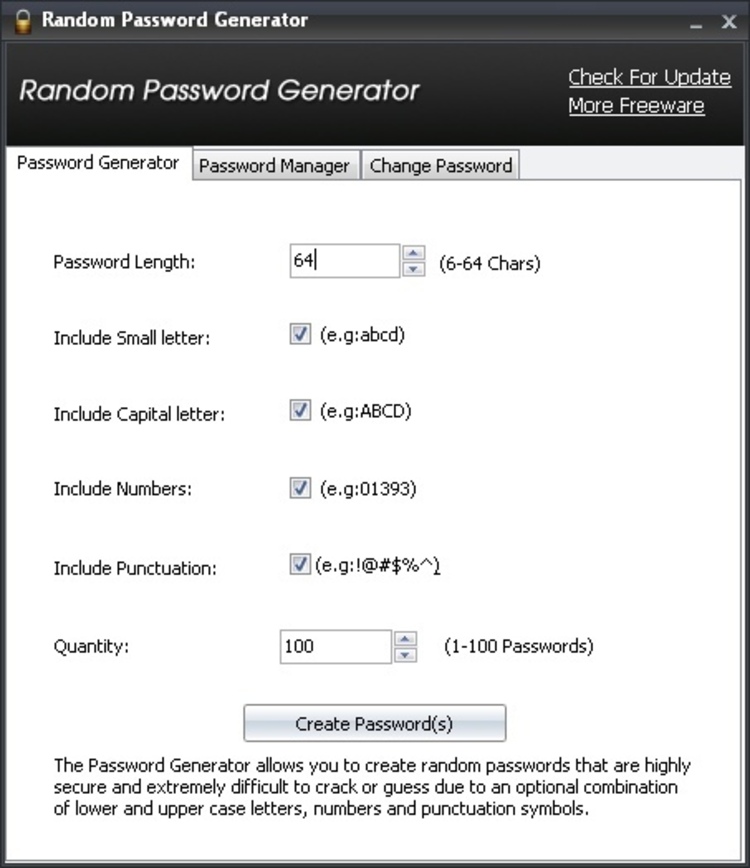
- RANDOM PASSWORD GENERATOR XKCD FULL
- RANDOM PASSWORD GENERATOR XKCD CODE
- RANDOM PASSWORD GENERATOR XKCD PASSWORD
RANDOM PASSWORD GENERATOR XKCD PASSWORD
Paste0("There are ", length, " unique words in this book (including diffent forms of the same word). from xkcdpass import xkcdpassword as xp create a wordlist from the default wordfile use words between 5 and 8 letters long wordfile xp.locatewordfile() mywords xp.generatewordlist(wordfilewordfile, minlength5, maxlength8) create a password with the acrostic 'face' print(xp. # Report the number of unique words in the bookįormat(big.mark = ",") # Add some nice formating

Mutate(word = str_extract(string = word, pattern = "]+")) %>% # remove any non-alphanumeric characters.Īnti_join(stop_words, by = "word") %>% # get rid of boring, "stop" words # load the stop words so that we don't have to reload it later # get all the titles for the drop-down menu
RANDOM PASSWORD GENERATOR XKCD CODE
You can see the code below (at the time this post was knit-the current code will always be on github here), and the live app is at. ((The comic illustrates the relative strength of passwords assuming basic knowledge of the system used to generate them. But that can readily be solved with a shiny app. Well that was super easy, wasn’t it? The only thing that isn’t easy with this setup is looking up a book to use. Those words are borrowed from xkcd password generator which borrowed it from wherever. Furthermore, you can find the Troubleshooting Login Issues section which can answer your unresolved problems. Generate random words from a list of words.

LoginAsk is here to help you access Random Password 4 Word Generator quickly and handle each specific case you encounter. # "choose" "content" "circumstance" "mingled" Random Password 4 Word Generator will sometimes glitch and take you a long time to try different solutions. Unlist() %>% # turn the column into a vector that sample() knows what to do with Unique() %>% # get rid of duplicate wordsĪnti_join(stop_words, by = "word") %>% # get rid of boring "stop" wordsĭrop_na() %>% # drop anything that didn't make it through cleanly This small application will automatically generate a random string of words to be used for easy to. Select(word) %>% # get rid of the extra columns Strong Password Generator (inspired by XKCD) J. Mutate(word = str_extract(string = word, pattern = "]+")) %>% # remove any non-alphanumeric characters Unnest_tokens(word, text) %>% # turn the text into a single column of words
RANDOM PASSWORD GENERATOR XKCD FULL
It is easy to download the full text with the gutenbergr package. Download scientific diagram This xkcd comic suggests that users can recall passphrases composed of random words better than lower-strength passwords that. Since Pride and Prejudice is currently the most downloaded book on gutenberg over the past 30 days and I happen to like it myself, I’ll use that as my example book. As long as I chose books somewhat randomly, I think that should be pretty secure.įirst I will load the required packages.

So I thought that it would be fun to make my own generator using books from as my dictionaries, that way I would at least know where they are coming from. But I have to wonder what dictionaries these sites use and how random the words are that they spit out. I have been inspired by this informative XKCD comic on password security, and I often follow its advice by using random-word-generating websites.


 0 kommentar(er)
0 kommentar(er)
